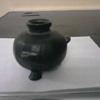Posted 7 years ago
 medicoirfan
medicoirfan
(44 items)
Hi everybody,
This ammo box, I had brought from a junk sale. Dimensions are 25×20×5 cm. Written on it are
Side 1 --- 250 RDS; 7.62 MM BALL; IN BANDOLIERS; K.F.I - 10 - 64
Side 2 ---- 7.62 MM.A ; BDR then a sign of six with something written around it, first word not identified second word is explosive
Side 3 ---- 7.62 mm.A; BDR, THEN something I can't read....this is narrow side
Base is inscribed with- ACC HIA; 1963 ISH.284A















Can anybody explain about it and help to identify the missing letters ?.....The six sign is also a mystery
Vietnam era likely. For an M60 machine gun. I think the 6 was added by someone other than the military.
Military ammo can. NOT for an M-60. M-60 ammunition comes in belts not in bandoliers.
Maybe for an M-14 or other similar weapon?
scott
Thank u so much....Fortapache and Scottvez...only thing I m not getting is that white sign of 6 with one word 'explosive around it and the word I can't read nor guess....I had given this box for restoration but don't knòw what to tell the mechanic to write in place of that word.....I think it either a classification of explosive or a hazard sign for explosive...
It is a later "addition".
These ammo cans are popular on the surplus market for a lot of different uses-- I knew an NCO who sent his kids to school with these as lunch boxes!
scott
Yes, Vietnam. Bandoliers were cloth sashes that were used to carry the 7.62MM ammo for the M1 carbine (.30 cal.). Commonly called the M1 "Garand". The M14 used the 7.62 x 51 (.308 cal). The M14 replaced the M1 Garand in the Army in 1961 and the Marine Corps by 1965.
The M16 (5.56 MM) was introduced just 3 years later in 1964, but there were still a lot of die-hard M1 Garand and M14 users. (The M14 was notorious, however, for hanging up on full auto.)
As scottvez says these cans were re-purposed quite a bit and repainted even by the military when they were used for another purpose.
I think I made out parts of the lettering - close study seems to be "Claymore, EXT - Explosive". This might have been packed later with detonation cord "extensions" for the Claymore mine. I recall they were packed in ammo boxes to protect them from water damage and eventual misfire. They originally came in thick plastic "envelopes" in a cardboard box, but were repacked in ammo cans and marked for transport to the field. The 6 may mean the number of them in the can.
Now, I might be TOTALLY wrong, but I'm working with an old memory and old eyes.
Thank u RCassano and Scott for looking into it....and I truly appreciate it. So it is clear now that the white sign was for repacking of the this can with Claymore mine. And that is really good to know....now I can continue with the restoration.....
Thank u once again
Ladies and gentlemen, presenting before you ....The restored version of my Ammo Box.
Outstanding !
Just curious. Knowing the word "claymore", were you able to piece together the fragments of broken and smudged lettering ?
Yes i cleared it more and took a picture of it and then placed it in an image editing software, THEN changed the contrast and colour saturation and with some other tools ..the word become some more relevant and with your advice I decided to put "claymore"only....earlier i was totally blank but with your suggestion the word revealed itself......what mind doesn't know, eyes can't see....
Thanks again for the help
Not a fan of the repaint.
Some of my thoughts on the subject....
Bandoliers are not specific to the M1. With the M16/ M4, you can order ammunition in boxes or in bandoliers. The bandolier is more of a "combat" configuration as they can be loaded much quicker since they come in 10 round clips with speed loaders. It is also easier to grab a bandolier vice several small boxes.
I don't recall how claymores come boxed, but I do recall getting them in a combat zone in a set inside the claymore bag. There is no such thing as a "detonation cord extension". A STANDARD claymore has an electrical firing system with an electric blasting cap. It can be fired by other means, but that requires items NOT in the standard issue.
It is possible that for stateside safety reasons, someone created the additions to the ammo can to transport parts of the claymore. It is not something that would be typically done in a combat zone.
For the above reasons, I find a "combat" bandolier ammo can much more interesting than a stateside training configuration. I'd drop the white paint additions from the restoration.
scott
Well....I don't know what to say....am dependent on advice you people only
I'm a little late to the party, but I don't think this is a U.S. ammo box.
Well it is in India....so may be India made....but their are good chances of it being an american
If the Americans bought it, it should have a warning label on it. MADE IN CHINA. LOL. I'm not familiar with Amer ammo boxes of this size with corrigated sides.